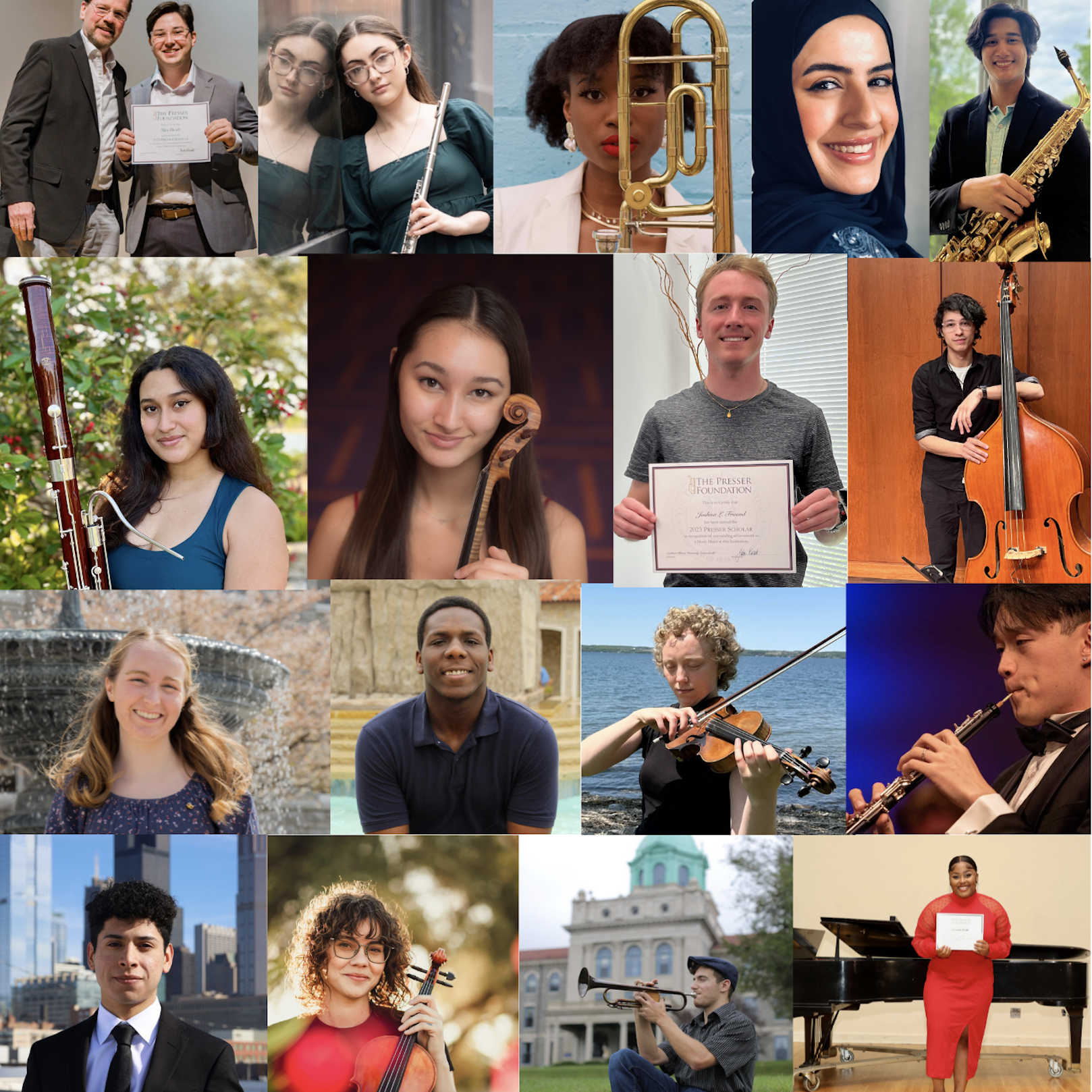The Presser Foundation Undergraduate Scholar Award program has been a core grant program since the founding and as stipulated in the Will of Theodore Presser. The program has evolved over the years and at the close of the most recent fiscal year, 221 institutions of higher education awarded $4,000 to music majors at the end of their junior year. These Presser Scholars used the Award in a variety of ways, including to purchase new instruments, attend additional music classes and events, summer study abroad, and tuition.
In February 2023, the Foundation’s Scholar Award Committee met to discuss the program with the encouragement and guidance of Dr. Jeffrey Cornelius, former Board President and current Honorary Trustee. Designed as a strategic meeting to discuss the impact of the program as well as who it serves, the Committee and staff reviewed data, aspects of administering the Award, and various elements of the program. Throughout the meeting, the Committee considered how equity and inclusion are currently centered in the program and what more could be done to center equity.
Committee Chair Dr. Mark Wait used the phrase “fundamental realignment” to discuss potential changes to the program, which accurately reflects the changes discussed and decided on, many of which were outlined in a previous blog post.
This post seeks to go deeper to explain not only the changes themselves, but the reasoning behind them.
Expansion of included schools
For years, the Foundation has invited schools to apply to be in the program that maintain a minimum enrollment of 60 undergraduate music majors (that minimum enrollment number has changed throughout the years) and show evidence of meeting high professional standards for faculty, curriculum, and facilities.
The minimum enrollment number prevented many schools with smaller, yet still excellent, music programs from applying, including many Historically Black Colleges and Universities (HBCUs), Hispanic-Serving Institutions (HSIs), and Tribal Colleges.
Keeping in mind its efforts to center equity, the Scholar Award Committee recommended to ease the minimum music major requirement, thus enabling the expansion of the program to the above schools that are accredited by the National Association of Schools of Music (NASM).
The Foundation aims to invite 62 new schools and their respective music programs (35 HSIs, 26 HBCUs, and 1 Tribal College) to participate in the program during the 2023-24 year and beyond.
Until further notice, as the program undergoes substantial changes, the Foundation will close the open application process.
Award Amount
The Foundation remains committed to the 221 schools currently in the program. With this commitment, the accommodation to the 62 new invited schools, and the obligations to its other grantmaking programs, the Scholar Award amount will be reduced from the long-time amount of $4,000.
For the 2023-24 year, the Award will be $3,000. Moving forward, the Foundation pledges to ensure that the Award amount is still meaningful and will continue to conduct research and listen to anecdotal evidence about the impact of the Award amount on students.
Focus on student rather than institution
For many years, the Scholar Award program placed the emphasis on the institution rather than the selected student recipient.
For example, schools that applied to the program for the first time and schools that were evaluated (which happens every five years) were asked to share how many practice rooms their respective institution has, the number of performance facilities, the amount of aid given to music students, music holdings in the library, etc. With these questions, the Committee assessed the schools and their respective music departments, thus focusing on the music programs rather than the students receiving the Award.
With the changes, the Foundation is shifting the focus from the institution to the student. While schools will still be selected based on the quality of their music program, they will not be asked to include information about their facilities, library holdings, or other details about the program. At this time, most of the new schools being added are accredited with NASM. Moving forward, the Foundation will continue to analyze how and in what ways the quality of the music program will be assessed.
Another change will be to move giving the Award at the end of a student’s third year to the end of their final year of study. The Foundation hopes that this modification will result in fulfilling more of the true spirit of an Award and its intended use – honoring students for their efforts during their time at the school.
Student focus on equity and inclusion
The Foundation has always given each music department or school the opportunity to choose the student selected as the Award recipient. The Foundation has asked that the chosen student demonstrates “high academic and musical accomplishment, leadership, and citizenship.”
Moving forward, the Award will not only celebrate a student who exhibits the characteristics above, they will also each exemplify the values of equity and inclusion. The Foundation is eager to learn more about how these leaders demonstrate these values and the Foundation’s mission to contribute to a more equitable world.
Conclusion
As shared by Dr. Wait above, the changes made for the 2023-24 year are truly a fundamental realignment to the way the Undergraduate Scholar Award program has been structured, but in many ways just a first step. More research, more engagement, and more assessment will be needed to understand the impact of these changes, both on current institutions and on the newly invited ones, and what more could/can be done. The Foundation welcomes conversation and questions about the Scholar Award program.
Overall, we hope that this realignment, which has been guided by the Scholar Award Committee and Dr. Cornelius, moves one of the Foundation’s grantmaking areas more in line with its work to center DEI. We are not finished in this journey but hope to spark change and deep thinking about how each and every grantmaking area centers equity.








